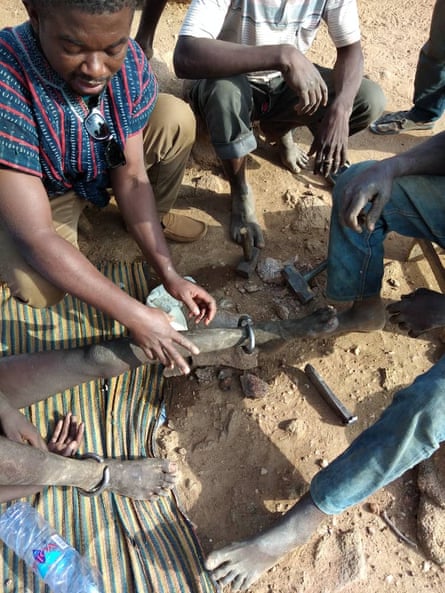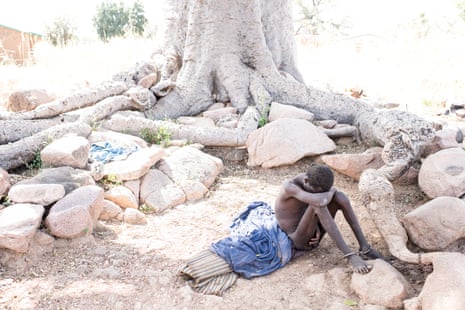Last November I travelled with the Guardian to the upper-east region of Ghana. Our aim was to see how mental illness is treated in communities that have scant access to health services.
Under a hot sun in Harmattan season, in the little village of Zorkor, we met Baba, a 30-year-old man in a horrible condition, shackled and chained under a Boabab tree just in front of his family house.
I saw him naked, sitting on faeces. There was an old mat which was wet with urine serving as a bed and a black bag which I think he used to cover himself when the rains came. He had not bathed for months and he smelled very bad.
His mother came out of a mud house and we asked to talk to her. She told us that Baba had been like this for three years. Baba’s late father had kept him in that condition because Baba had threatened to kill her. I asked her why she hadn’t released him from the shackles during all those years and taken him to the hospital?
Her answers were sad: “I am poor and cannot afford even the transportation to the hospital, never mind talk of the medication.” Baba’s mother loves him, it is only poverty that makes it seem as if she doesn’t.
The Guardian published the story of Baba and it seems people were moved by it – just days after the story was published, my organisation, the Mental Health Advocacy Foundation (MHAF), began receiving donations to support Baba. I was amazed and delighted. This meant that I could assist Baba and his family. A community mental health officer and a local NGO were able to help, and in December I was told that he was responding to treatment and plans were in place to free him from the shackles.
But when I travelled back to visit Baba in February, I was so sad to find him still chained naked under the Boabab tree. He was being given his medication but the local health workers said his family, who had to go to work and leave his elderly mother alone, were still afraid that he might attack her.
I immediately went to a nearby market and bought some clothes, sandals and food for Baba, who had complained of being hungry. I bought him banku (fermented corn and cassava dough) with light soup and fish and beef. He could keep none of it down and he vomited.
Baba’s mother was happy that I had kept my promise of visiting them again and welcomed me. We talked about how to empower the family economically to help Baba. She was overwhelmed, and asked for time so she could involve some extended family members. It was getting dark so I found the nearest guesthouse, an hour’s bumpy motorcycle trip away. It ended up being a two-night stay.
I met with the family, explaining that Baba had to be unshackled and taken to the hospital. It wasn’t easy for them to agree. Who would accompany Baba to the hospital and so not earn enough to eat that day? Who would pay hospital bills? I suggested that I would take him to Tamale to the hospital where I work, some six hours’ drive away. His medical bills, I told them, would be paid by my organisation. I felt scared about this risk, because if anything happened to Baba, now I would be held responsible. Finally, the family agreed.
We tried to free Baba, using a borrowed hammer and a chisel. It wasn’t easy. Whenever the uncle hit the hammer I could see that it hurt Baba. I kept my hand on him to make sure the chisel didn’t cut his legs. Gradually, the chain came loose but not the iron metal holding the shackles together. I had to take Baba to a blacksmith later at Tamale to removed the remaining metal from his ankles. But he was free. Taking him to the bathroom to wash and dress was difficult because he struggled to stand and walk after lying in one place all those years.

The local health worker arranged for someone to come with a car. An uncle accompanied us, and later his elder sister was able to get to the hospital.
On the way to Tamale, we stopped to buy food. Again Baba tried to eat his banku, again he vomited, this time on my lap inside the taxi. At the Tamale Teaching Hospital doctors carried out a raft of tests and Baba was transferred to a ward, where he would spend nearly two weeks.
Baba was discharged from the hospital with psychotropic medication on 18 February 2020. I took him to the shops to buy him some clothes and to the barber for a shave. Although he still speaks very little, Baba was excited and extended his hand to me. He had a charming smile and told the shop assistant how beautiful the clothes were and how he loved them.
I took Baba and the sister to the bus terminal to get a bus back to the village. I couldn’t accompany them because I was on duty at the hospital that day. While waiting for the bus to fill, I talked with Baba. He told me he would be a good person. He asked if he could come back to Tamale to stay with me. We laughed and I told him to spend some wonderful time with his mother first. He saw a bread seller and got very excited, so I bought a loaf for him to eat.
Treating someone who is mentally ill involves many things. Medication alone cannot work magic. Some medicines used to treat mental illness increase the appetite, and some families cannot even afford one square meal a day, never mind three.
Sometimes Baba’s mother cannot even afford one meal a day for herself and Baba. The mental health law in Ghana says that treatment is free. But in rural communities access to medication is insufficient, and families have to buy their own when the government supply is not available.
Baba needs a constant supply of medicine and food. We needed to generate income for the family, so MHAF raised additional funds to support Baba to get into farming, buying him some goats. Local people helped Baba; they couldn’t believe the transformation happening to their beloved brother.
Now the community mental health officer will help to make sure Baba does not relapse, visiting him every two weeks to monitor his medicine and possible side-effects. This officer has been very helpful in Baba’s recovery.
After Baba was freed, we updated the people who had donated through social media. The funds were used to free other people whom I met with the Guardian – John, Gideon, Sambeche and Moses – from their chains. Sara, a woman with postnatal depression, has been reunited with her children.
Today Sara, John and the rest are working on a farm, and my charity has provided seed and fertiliser. In July, I visited Baba again. I found him sitting comfortably under the tree he was shackled and chained to just a few months ago. He ran up to hug and welcome us. He was full of smiles and happiness. He ran to show me his animals.

He said: “Have you come to take me to Tamale? So I can eat banku with fish?”
I had brought banku on the way and gave it to Baba. This time, he was able to eat it.
The family and I all sat under the Boabab tree and talked about a lasting recovery for Baba. His elder sister was full of thanks – the MHAF has helped her business to survive, which means she can in turn help her mother.
Baba’s mother was crying: “I’m overjoyed. Baba was in shackles, no matter the weather conditions. I felt bad about the situation of my son but I felt helpless because we are poor. I used to shed tears because of Baba’s previous condition. Baba was nothing, but now he is human again, I am very happy.”
I left their community to visit another, where two people were shackled, one under a tree and the other in a room.
This work is hard. It is hard to see people in chains, and it is hard to see their families in pain. It is rewarding for me to be able to free my country men and women from the chains that hold them back from fulfilling lives. All they often need is a little medication, a little financial support, a little love and they can help themselves. It doesn’t take much to change the life of someone in chains.
Last week I called the health worker in Baba’s village. They told me Baba now goes around helping his neighbours to harvest their crops.









